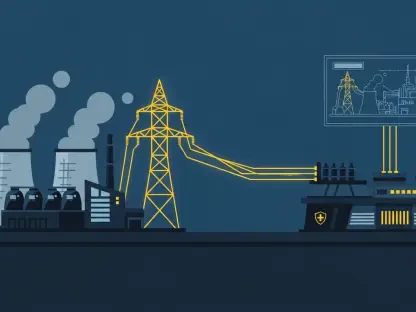Imagine a critical lifeline of energy supply being suddenly rerouted, leaving a nation scrambling to secure its fuel needs amid mounting geopolitical pressures, and this is the stark reality for India, a country heavily reliant on Russian crude oil, as U.S. sanctions tighten their grip on global trade routes. With over a third of its oil imports coming from Russia, India faces unprecedented challenges as vessels carrying this vital resource are diverted to other destinations. This roundup dives into the multifaceted impacts of these sanctions, gathering opinions, tips, and analyses from various industry perspectives to shed light on how such measures are reshaping oil trade dynamics and testing energy security.
Unpacking Diverse Views on U.S. Sanctions and Russian Oil Trade
Sanctions as Economic Leverage: A Strategic Perspective
Industry observers note that the recent U.S. Treasury Department measures, targeting over 115 Iran-linked entities and vessels involved in Russian oil transport, represent a calculated move to curb Russia’s financial capacity to sustain its military actions. Many strategists argue that these sanctions, coupled with calls from U.S. leadership for a global halt on Russian oil purchases, aim to isolate Russia economically. This approach is seen as a powerful tool of economic warfare with far-reaching implications for countries dependent on Russian energy.
A contrasting viewpoint emerges from trade analysts who caution that such aggressive policies may inadvertently strain allies like India. They highlight that while the intent is to pressure Russia, the collateral damage to nations balancing energy affordability with geopolitical alliances could destabilize regional markets. This tension between strategic goals and unintended consequences remains a hotly debated topic among global policy experts.
Some voices in the energy sector suggest that sanctions might push Russia to pivot toward alternative markets, potentially strengthening ties with other major buyers. This shift could reshape long-standing trade patterns, raising questions about the effectiveness of isolating a resource-rich nation through such measures. The complexity of these outcomes underscores the need for a nuanced understanding of global economic interdependencies.
India’s Position: Energy Needs Versus Geopolitical Pressures
Turning to India’s specific challenges, many energy consultants emphasize the nation’s vulnerability due to its heavy reliance on Russian oil. With domestic refiners sourcing a significant portion of crude from Russia to meet energy demands, the diversion of shipments creates immediate logistical hurdles. Industry insights point to a growing concern over how sustained disruptions could inflate costs and threaten supply stability.
On the other hand, some market watchers argue that this crisis presents an opportunity for India to reassess its energy import strategies. They propose that while short-term pain is inevitable, the situation could catalyze investments in alternative suppliers or domestic energy solutions. This perspective sees the sanctions as a wake-up call for reducing over-dependence on a single source, even one as cost-effective as Russia.
A third angle comes from geopolitical analysts who stress that India’s delicate balancing act between Western alliances and Russian trade partnerships is under strain. They warn that navigating this tightrope will require diplomatic finesse to avoid alienating key stakeholders on either side. The consensus here leans toward the need for strategic dialogue to mitigate the fallout from these external pressures.
Ripple Effects on India’s Oil Supply: A Spectrum of Opinions
Vessel Diversions: Industry Reactions to Disrupted Routes
Focusing on the tangible impacts, shipping industry sources report that specific vessels, such as Aframaxes Tagor and Guanyin, and Suezmax Tassos, originally destined for Indian ports like Chennai and Sikka, have been rerouted to locations like Dalian, China, and Port Said, Egypt. Many in the logistics sector attribute these diversions directly to the inclusion of these ships on the U.S. sanctions list, disrupting planned deliveries.
Differing opinions arise regarding the response from Indian refiners. Some industry insiders note a palpable hesitance among companies like Reliance Industries to confirm unloading of affected shipments, reflecting a cautious approach to compliance risks. This uncertainty is seen as a significant barrier to maintaining consistent supply chains under the current regulatory climate.
Others in the trade community point out that while diversions are disruptive, they are not entirely unexpected given the escalating Western sanctions. They argue that shipping firms and refiners must adapt swiftly by identifying alternative routes or buyers, even if it means absorbing higher costs. This pragmatic stance highlights the resilience required to navigate such turbulent waters.
Energy Security Concerns: Risks of Over-Reliance
Delving into broader implications, energy security experts express alarm over India’s deep dependence on Russian oil amidst tightening sanctions. They cite delays faced by major refiners like Indian Oil Corp and Bharat Petroleum Corp Ltd. as evidence of the vulnerabilities in the current supply framework. The risk of prolonged disruptions looms large in these discussions.
A counterperspective from economic analysts suggests that while the situation is challenging, it is not yet catastrophic. They believe India has the capacity to weather short-term shocks by leveraging existing stockpiles and exploring emergency procurement from other regions. This optimism hinges on the assumption that temporary measures can bridge the gap until more stable solutions emerge.
Yet another viewpoint focuses on the long-term ramifications, with some industry leaders advocating for a strategic pivot away from heavy reliance on any single supplier. They argue that diversifying import sources, though costly and complex, is essential to safeguard against future geopolitical shocks. This forward-thinking approach is gaining traction as a potential blueprint for energy resilience.
Geopolitical Shifts: Redefining Trade Landscapes
Exploring the global context, many international trade specialists highlight how Western nations are using sanctions to economically isolate Russia, pushing vessels to seek alternative markets like China. This trend is viewed as a significant realignment of oil trade flows, with the potential to alter power dynamics in the energy sector over the coming years.
Regional differences in sanction enforcement add another layer of complexity, according to some policy analysts. They note that additional British and EU restrictions on vessels like Achilles and Elyte complicate the landscape for Indian refiners, positioning India at a crossroads in the global oil market. The varying intensity of enforcement raises questions about the equitable application of such measures.
A differing opinion from market strategists questions the sustainability of these redirected trade patterns. They suggest that while alternative destinations may absorb some supply in the near term, the long-term viability of bypassing traditional buyers like India remains uncertain. This skepticism fuels ongoing debates about the adaptability of global oil trade under sustained geopolitical strain.
Corporate Responses: Navigating Compliance Challenges
Shifting to corporate strategies, industry commentators observe that Indian firms, particularly Reliance Industries, are treading carefully amid sanctions scrutiny. Reports of companies denying ties to sanctioned vessels despite prior dealings indicate a heightened focus on compliance, driven by the fear of punitive repercussions from Western authorities.
Comparatively, other voices in the business community note a spectrum of responses across the sector, with some refiners exploring alternative suppliers despite a constrained market. General insights from market experts suggest that finding reliable substitutes for Russian oil is fraught with challenges, including price disparities and logistical hurdles, making quick transitions difficult.
Looking ahead, some corporate advisors speculate on potential strategies such as negotiating exemptions or accelerating diversification of import sources. They argue that proactive measures, including investment in supply chain flexibility, could mitigate the impact of sanctions on operational continuity. This strategic foresight is seen as critical for maintaining competitiveness in a volatile environment.
Key Takeaways from the Oil Diversion Debate
Summarizing the insights gathered, it becomes evident that U.S. sanctions are actively redirecting Russian oil away from India, posing both immediate logistical challenges and long-term uncertainties for energy security. The diverse opinions highlight a consensus on the disruptive nature of these measures, though perspectives differ on the severity and solutions. While some see opportunity in adversity, others underscore the risks of over-reliance and geopolitical entanglements.
For stakeholders, actionable steps include diversifying energy imports to reduce dependence on a single source, bolstering domestic refining capacities to enhance self-sufficiency, and engaging in diplomatic efforts to navigate competing international pressures. These strategies aim to build resilience against unpredictable trade disruptions. Additionally, monitoring global sanction updates and exploring investment in alternative energy markets can serve as hedges against supply volatility.
Reflecting on the Broader Implications
Looking back, the discourse surrounding U.S. sanctions revealed an intricate web of economic, geopolitical, and corporate challenges that reshaped the flow of Russian oil. The insights from various industry perspectives underscored the profound impact on India’s energy landscape, highlighting both vulnerabilities and potential pathways for adaptation. The discussions painted a picture of a nation at a pivotal moment, forced to recalibrate its energy strategies under intense external pressures.
Moving forward, a critical next step involves fostering international collaboration to stabilize oil trade amidst such disruptions. Policymakers and businesses alike should prioritize building robust contingency plans, such as securing multi-regional supply agreements, to prevent future crises. Exploring innovations in energy efficiency and renewable sources also emerged as a vital consideration to lessen dependence on geopolitically sensitive imports, paving the way for a more secure energy future.









